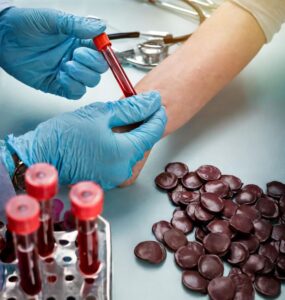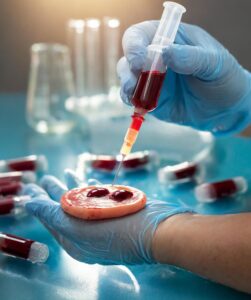
Key Takeaways for Thalassemia & Stem Cell Treatment
- Thalassemia is a serious genetic blood disorder, often managed with lifelong transfusions, but hematopoietic stem cell transplantation (HSCT) offers a potential for long-term independence from transfusions.
- HSCT for thalassemia is a complex procedure requiring careful patient selection, specialized medical teams, and robust post-transplant care.
- Colombia’s healthcare system, regulated by entities like the Ministry of Health and INVIMA, maintains high standards for advanced medical therapies, including HSCT.
- Pereira, Colombia, provides a unique environment for medical care, blending advanced clinical services with a supportive, patient-focused atmosphere.
- Regencord offers a structured patient journey, empathetic support, and transparent communication, guiding individuals through their treatment options for thalassemia.
- Understanding your options and seeking a confidential case review is a critical first step toward making an informed decision about your health.
Navigating Stem Cell Treatment for Thalassemia: Your Guide to Options in Pereira, Colombia
Introduction: Understanding Thalassemia and the Hope of Stem Cell Treatment
Thalassemia is a genetic blood disorder that affects millions worldwide, including many families in Colombia. It significantly impairs the body’s ability to produce healthy hemoglobin, leading to severe anemia, organ damage, and a lifelong dependence on blood transfusions for many. For years, managing thalassemia has focused on supportive care, but scientific advancements now offer transformative possibilities.
Among these, hematopoietic stem cell transplantation (HSCT), often referred to as a bone marrow transplant or simply “stem cell treatment,” stands out as a pathway to potential long-term resolution. This procedure, which replaces diseased blood-forming cells with healthy ones, can offer individuals with thalassemia the opportunity for a life free from regular transfusions and the myriad complications associated with the condition. It’s a journey of hope, complex medical science, and deeply personal decisions.
At Regencord, located in the vibrant city of Pereira, Colombia, our team understands the profound impact thalassemia has on individuals and their families. Our aim with this guide is to empower you with clear, accurate, and ethical information about stem cell treatment for thalassemia. We believe that informed patients make the most confident decisions, and our commitment is to walk alongside you, offering clarity and support every step of the way.
The Stakes: Living with Thalassemia and Its Critical Implications

Living with thalassemia can present significant challenges. The genetic defect reduces the production of vital hemoglobin, leading to chronic anemia, fatigue, weakness, and often, the need for frequent blood transfusions. While transfusions are life-sustaining, they also carry risks, including iron overload which can damage the heart, liver, and endocrine system. As highlighted by the World Health Organization (WHO), thalassemia poses a substantial global health burden, necessitating comprehensive management strategies.
Beyond the physical symptoms, the emotional and logistical toll on patients and their families is immense. Managing transfusions, chelation therapy (to remove excess iron), and regular medical appointments requires unwavering dedication and can impact quality of life, education, and career opportunities. The search for a more definitive solution becomes a paramount concern, driving many to explore advanced treatment options like HSCT.
According to research published in PubMed-indexed journals, uncontrolled thalassemia can lead to severe complications such as:
- Cardiac issues (heart failure, arrhythmias) due to iron overload.
- Liver damage (fibrosis, cirrhosis).
- Endocrine dysfunction (diabetes, delayed puberty, thyroid problems).
- Bone deformities and osteoporosis.
- Increased susceptibility to infections.
These critical implications underscore the importance of exploring all available pathways for managing and potentially overcoming thalassemia. For many, HSCT represents a powerful step toward reclaiming health and independence.
The Conventional Approach to Thalassemia Management in Colombia

In Colombia, the management of thalassemia, as with many chronic conditions, typically follows established protocols focused on supportive care. This involves regular blood transfusions to maintain adequate hemoglobin levels, coupled with chelation therapy to manage the iron overload that inevitably results from these transfusions. These vital treatments are generally available through the country’s healthcare system, which operates under the oversight of the Colombian Ministry of Health and Social Protection (Ministerio de Salud y Protección Social).
For patients requiring advanced interventions, specialized centers within Colombia are equipped to provide care, though access may vary by region and individual health plans. Diagnosis often begins with genetic testing and blood work, confirming the specific type of thalassemia and guiding the initial treatment plan. Medical professionals in Colombia are trained to manage the complexities of this genetic blood disorder, often adhering to national guidelines that align with international best practices.
However, the journey for a patient with thalassemia is often lifelong, demanding continuous engagement with healthcare providers and a persistent need for medical resources. While conventional therapies are crucial for survival and quality of life, they do not address the root genetic cause of the condition. This reality drives many to seek more definitive solutions, leading them to explore the potential of hematopoietic stem cell transplantation as a potentially curative approach.
Regulatory bodies such as INVIMA (Instituto Nacional de Vigilancia de Medicamentos y Alimentos) play a crucial role in ensuring the safety and quality of medical products and procedures within Colombia, including those related to blood banking and advanced therapies. Patients can have confidence that the healthcare infrastructure in Colombia adheres to recognized standards, though the highly specialized nature of HSCT means that careful selection of a dedicated center is paramount.
The Pereira, Colombia Advantage: A Holistic Approach to Advanced Care

When considering advanced medical treatments like hematopoietic stem cell transplantation for thalassemia, the choice of location and provider is critical. Pereira, Colombia, offers a compelling environment for such specialized care, particularly through the patient-centered approach cultivated at Regencord.
A Modern Medical Infrastructure with a Human Touch
Colombia has invested significantly in its healthcare infrastructure, with major cities like Pereira now boasting modern hospitals and clinics equipped with advanced technology. These facilities operate under the strict regulatory framework of the Colombian Ministry of Health and INVIMA, ensuring adherence to national and often international standards for patient safety and quality of care. At Regencord, this commitment to excellence is paired with a philosophy that prioritizes the patient’s overall well-being, not just their medical condition. We integrate state-of-the-art diagnostic and treatment protocols with deeply personalized attention.
The Patient Journey in Pereira: Support from Start to Finish
Our experience reveals that patients facing thalassemia, particularly those considering a stem cell transplant, often feel overwhelmed by complex medical information and the emotional weight of decision-making. We address this by providing a structured, empathetic support system. From your first contact, our team helps demystify the process, from initial consultation and eligibility assessment to donor matching, the transplantation procedure, and crucial post-transplant follow-up. Our goal is to ensure you never feel alone, offering transparent communication and guidance tailored to your specific needs.
This includes:
- **Comprehensive Case Review:** A thorough evaluation of your medical history to determine the most appropriate pathway.
- **Personalized Treatment Planning:** Development of a detailed treatment plan, incorporating the latest evidence-based practices for HSCT in thalassemia.
- **Dedicated Patient Advocacy:** A consistent point of contact to answer questions, explain procedures, and provide emotional support throughout your journey.
- **Integrated Post-Transplant Care:** A robust plan for recovery and long-term monitoring, essential for sustained health following HSCT.
A Healing Environment Beyond the Clinic
Pereira, nestled in the heart of Colombia’s coffee region, offers more than just advanced medical facilities. Its temperate climate, lush natural surroundings, and warm, welcoming culture contribute to a healing environment that extends beyond the clinical setting. Patients often find that the tranquil atmosphere and genuine hospitality foster a sense of peace and support during intensive treatment periods. This qualitative insight, derived from facilitating numerous patient journeys, underscores how the city’s inherent supportive community and serene landscapes can enhance patient well-being and recovery.
Choosing Regencord in Pereira means selecting a pathway that combines clinical rigor with a compassionate, holistic approach. We believe that an optimal healing experience is achieved when advanced medical science is delivered within an environment that nurtures the patient’s entire being.
Your Practical Resource: The Regencord Thalassemia Care Navigator

Navigating Your Options with Confidence
Understanding the complex world of stem cell treatment for thalassemia requires clear, actionable guidance. That’s why the team at Regencord has developed the **Regencord Thalassemia Care Navigator** – a practical resource designed to help you organize your thoughts, questions, and essential information as you explore your treatment options.
How the Navigator Helps You:
- **Personalized Symptom and Treatment Tracker:** Helps you document your current symptoms, conventional treatments, and their effectiveness, providing a comprehensive overview for discussions with your medical team.
- **Key Question Checklist for HSCT:** A guided list of critical questions to ask during consultations about hematopoietic stem cell transplantation, covering eligibility, risks, benefits, and post-transplant care.
- **Information Gap Identifier:** Helps you pinpoint areas where you need more clarity, ensuring you address all your concerns before making decisions.
- **Logistical Planning Assistant:** Assists in outlining potential logistical considerations for treatment, including facility location, support systems, and follow-up care within Colombia.
- **Decision-Making Framework:** A structured approach to weigh the pros and cons of different treatment pathways, aligning them with your personal health goals and values.
This tool is designed to empower you with organization and clarity, transforming the perception of a complex process into a manageable, supported pathway. It’s a testament to our commitment to patient advocacy and education.
To learn more about how to utilize the Regencord Thalassemia Care Navigator, please contact us for guidance during your confidential case review.
Our Regenerative Philosophy and Patient-Centered Approach

At Regencord, our philosophy is rooted in the belief that every patient deserves access to the most advanced, ethically-sound, and personalized medical care available. For conditions like thalassemia, where conventional treatments primarily manage symptoms, our focus extends to regenerative pathways that aim to address the underlying cause of the disorder.
We are not merely offering a procedure; we are offering a journey towards improved health and independence from the burdens of chronic illness. Our approach to stem cell treatment for thalassemia is characterized by:
- **Evidence-Based Practice:** All our protocols for hematopoietic stem cell transplantation are rigorously based on current scientific evidence, drawing from guidelines and research highlighted by authoritative sources such as the NIH, WHO, and PubMed-indexed journals. We prioritize treatments with established safety and efficacy profiles.
- **Patient Empowerment Through Education:** We believe that the best decisions are informed decisions. Our team is dedicated to providing clear, comprehensive explanations of thalassemia, HSCT, and all potential options. We explain the science, the process, and the realistic expectations, ensuring you understand every aspect of your care.
- **Ethical and Transparent Communication:** We adhere strictly to ethical guidelines, avoiding any unverified claims or guarantees of outcomes. Our discussions are always grounded in what is clinically achievable and supported by reliable scientific evidence. We focus on verifiable facts about the robust healthcare infrastructure in Colombia and our meticulous processes.
- **Holistic Support:** Recognizing that a medical journey impacts more than just the body, we integrate emotional and logistical support into every step of the patient journey. Our team acts as a dedicated advocate, navigating complexities and providing comfort. This deep contextual insight into the patient experience shapes how we deliver care.
- **Adherence to National and International Standards:** Our practices are aligned with the high standards set by the Colombian Ministry of Health and INVIMA, demonstrating a commitment to regulatory compliance and patient safety.
We see ourselves as partners in your health journey, guiding you with compassion and scientific rigor towards potential solutions for thalassemia. Our commitment is to provide the highest standard of care, ensuring you feel respected, informed, and supported.
Overcoming Common Hesitations: Why Seeking Clarity is a Strategic Advantage
It’s natural to have questions and concerns when considering a significant medical undertaking like stem cell treatment for thalassemia. Many individuals share similar hesitations, which our team at Regencord is prepared to address with transparency and empathy. Understanding these common barriers and how we approach them can provide you with a strategic advantage in your decision-making process.
Hesitation 1: “Is receiving medical care in Colombia safe and legitimate, especially for advanced therapies like HSCT?”
This is a fundamental concern, and rightfully so. However, Colombia has a well-established and regulated healthcare system. The Colombian Ministry of Health and Social Protection oversees all medical facilities, and INVIMA (Instituto Nacional de Vigilancia de Medicamentos y Alimentos) rigorously regulates advanced therapies and medical devices. Our facilities in Pereira adhere to these strict national standards, often aligning with international best practices. We focus on verifiable facts: Colombia’s robust healthcare infrastructure, specific government accreditations, and the high standards of medical training in the region. This shifts the focus from fear of the unknown to an understanding of a well-regulated system dedicated to patient safety and quality.
Hesitation 2: “Thalassemia management is lifelong. Is a stem cell transplant in Colombia a permanent solution, and what about post-transplant care for a local patient?”
While hematopoietic stem cell transplantation (HSCT) offers a pathway to long-term independence from transfusions, it is crucial to understand that it involves a rigorous recovery phase and ongoing monitoring. We clarify that HSCT aims for a sustained resolution to the underlying genetic cause. For Colombian patients, Regencord provides an integrated approach to post-transplant care, including detailed follow-up schedules, comprehensive patient education, and access to a dedicated local support team. This ensures continuity and personalized oversight, transforming the perception of a complex process into a manageable, supported pathway with an emphasis on long-term health management.
Hesitation 3: “This sounds too complicated and overwhelming. I wouldn’t know where to start.”
The journey to stem cell treatment can indeed appear daunting due to its medical complexity and the emotional weight involved. This is precisely where Regencord’s patient advocacy team becomes invaluable. We address logistical anxiety directly by outlining a clear, step-by-step patient journey. From your initial confidential case review to coordinating diagnostics, treatment, and follow-up, our team provides personalized guidance. We transform the perception of a complex process into a manageable, supported pathway, emphasizing our role as your steadfast companion throughout this journey.
Hesitation 4: “Cost is a major concern for advanced treatments like stem cell therapy. How does Regencord in Pereira address the financial burden for Colombian patients?”
We acknowledge the significant financial aspect of advanced medical care. While specific costs require a confidential case review tailored to your unique case, Regencord is committed to transparency. We strive to provide access to these therapies within a framework that considers local economic realities. We discuss transparent pricing and explore potential financial pathways, emphasizing the value proposition of receiving high-quality, ethically-driven care in Colombia, which can often be more accessible than in other regions for comparable services, especially when considering the integrated support and follow-up for Colombian patients.
By proactively addressing these common concerns, we aim to build trust and empower you with the clarity needed to make confident, informed decisions about your health. Your well-being and understanding are our utmost priorities.
Glossary of Key Terms
- Thalassemia
- A genetic blood disorder characterized by the body making an abnormal form of hemoglobin, leading to excessive destruction of red blood cells, which results in anemia.
- Hematopoietic Stem Cell Transplantation (HSCT)
- A medical procedure that replaces unhealthy blood-forming stem cells (found in bone marrow, peripheral blood, or umbilical cord blood) with healthy ones. It is also known as bone marrow transplant.
- Bone Marrow Transplant
- A procedure to replace damaged or destroyed bone marrow with healthy bone marrow stem cells. It is a type of hematopoietic stem cell transplantation.
- Genetic Blood Disorder
- A condition caused by an abnormality in an individual’s DNA that affects the blood or blood-forming organs.
- Hemoglobin
- The protein in red blood cells that carries oxygen throughout the body.
- Iron Overload
- An excess of iron in the body, often a complication of frequent blood transfusions, which can damage organs.
- Chelation Therapy
- A medical procedure that removes excess heavy metals, such as iron, from the body using chelating agents.
- INVIMA
- Instituto Nacional de Vigilancia de Medicamentos y Alimentos (National Institute for Food and Drug Surveillance), the Colombian regulatory agency for medical products and procedures.
- Graft-versus-Host Disease (GVHD)
- A common and serious complication of HSCT where the donor’s immune cells (graft) attack the recipient’s (host’s) healthy cells.
Frequently Asked Questions (FAQ)
What types of thalassemia can be treated with stem cell transplantation?
Hematopoietic stem cell transplantation (HSCT) is primarily considered for severe forms of thalassemia, such as beta-thalassemia major and some forms of alpha-thalassemia, especially in younger patients who have a suitable donor. Eligibility is determined through a comprehensive medical evaluation.
How effective is HSCT for thalassemia?
For eligible patients with a well-matched donor, HSCT can offer a high success rate, potentially leading to a long-term resolution of the condition and independence from regular blood transfusions. Success rates vary based on factors like donor match, patient age, and disease severity at the time of transplant. Studies highlighted by the NIH and published in PubMed-indexed journals continue to show promising long-term outcomes.
What are the risks associated with stem cell transplantation?
HSCT is a significant medical procedure with potential risks, including infection, graft-versus-host disease (GVHD), organ toxicity, and conditioning regimen-related complications. These risks are carefully managed by specialized medical teams, and patients undergo thorough assessments to mitigate them. Our team will provide a detailed discussion of these risks during your confidential case review.
Who is an ideal candidate for HSCT for thalassemia?
An ideal candidate is typically a younger patient with severe thalassemia who has a suitable human leukocyte antigen (HLA)-matched donor, often a sibling. However, advancements now allow for consideration of unrelated donors or haploidentical (half-matched) donors. Eligibility is always determined on a case-by-case basis after extensive medical evaluation.
What is the typical recovery process after HSCT?
The recovery process involves several phases. Immediately after the transplant, patients are closely monitored for engraftment and potential complications. This initial phase typically requires an extended hospital stay. Long-term recovery can take several months to a year, during which patients receive ongoing supportive care, follow-up, and monitoring for late complications. Regencord provides a comprehensive post-transplant care plan to guide you through this period.
Does Colombia have regulations for stem cell treatments?
Yes, Colombia has a robust regulatory framework for advanced medical therapies, including stem cell treatments. The Colombian Ministry of Health and Social Protection, along with INVIMA, are the key governing entities that ensure facilities and procedures adhere to national and international standards of safety and quality. Regencord operates in strict compliance with these regulations.
Your journey to understanding and addressing thalassemia is important. Let us help you navigate your options.
Discover if you are a candidate for the regenerative medicine pathways available through the team at Regencord in Pereira, Colombia. Contact us for a confidential case review.
Disclaimer: This article is intended for educational purposes only and does not constitute medical advice. Information provided is based on current understanding of thalassemia and stem cell treatment. Individual outcomes may vary. All clinical decisions must be made in consultation with a qualified medical professional. Veris Salus LLC acts solely as a marketing and patient-coordination facilitator for Regencord in Pereira, Colombia, and does not provide medical services.



